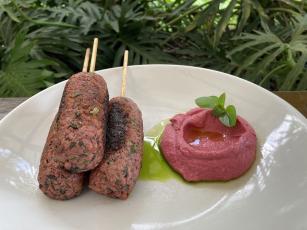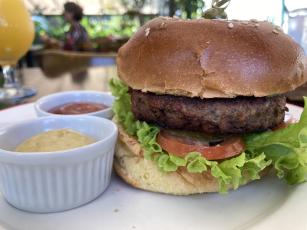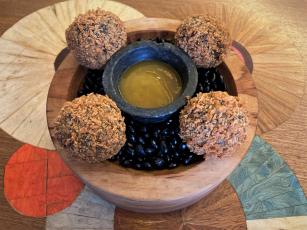Research develops plant-based products from cashew fiber
Research develops plant-based products from cashew fiber
Photo: Sottile Foods

Plant-based burger is similar to the conventional beef one in texture and flavor.
Coxinhas (an arancini-like snack shaped like and named after little chicken thighs), nuggets, koftas, hamburgers, croquettes and meatballs that do not use products of animal origin for their elaboration have been developed through a partnership between Embrapa Food Technology (Rio de Janeiro, RJ) and Sottile Foods, a company based in Niterói, RJ. The secret of the New Burger, for example, is the use of ingredients that give it characteristics that are very similar to the products elaborated with beef, as well as the addition of cashew fiber. The launch includes Siriju, a roll that is similar to crab cakes but is elaborated exclusively with plant ingredients.
The cashew fiber comes from Ceará, where Embrapa Tropical Agroindustry developed studies that have enabled its use as an ingredient. The Embrapa researcher Janice Lima reports that the initial idea was to stop wasting the cashew bagasse generated by the juice industry, which is used in animal feed.
The plant-based hamburger
The researchers noticed that many people in Ceará state had already been using the fiber to produce hamburgers, though with low protein content. Hence they tested adding other protein sources had, such as textured soy protein. “The tests also aimed at working with the fiber so that it tasted less like cashew and had a more pleasant texture for consumption”, recalls the scientist who worked at the Embrapa center in Fortaleza, the capital of Ceará, at the time.
Similar flavor and texture |
Now working in the Rio de Janeiro research unit, Lima has been working on the development of products with Sottile alongside the Embrapa analyst André Dutra, with information like how to handle cashew fiber or the ingredients that could improve sensory characteristics like flavor, appearance and texture of the products. “The soybean and cashew fiber-based hamburger is very similar in terms of texture, color and flavor to the one made of beef. Those who are used to consuming beef burgers will not feel much difference in flavor and texture and will consume a product that is vegetarian and rich in fiber”, the researcher details.
Sustainable and healthy alternative
According to Dutra, the use of cashew fiber from the native fruit, which has large plantation and production areas in the Brazilian Northeast, promotes a sustainable solution to waste from the juice industry. Data from the Brazilian Institute of Geography and Statistics (IBGE) show that, in 2017, Brazil produced about 60,000 tons of cashew, 75% of which correspond to the leftover fiber after the the juice and nuts are processed.
The analyst stresses that the products add value to the cashew chain and have the differential of their healthy appeal. “They are rich in fiber, an important component in human diets which also provides the developed products with calory reduction”, she reveals.
A vegetarian product company
Sottile Foods started out as a vegetarian product company in 2018. One of the partners, Thiago Rosolem, recalls that he and his brother, Bruno Rosolem, were looking for something similar to jackfruit to manufacture the products and heard about Embrapa's study on cashew fiber and its benefits. “Since 2018, we have been working on this project with Embrapa for the development of food products from cashew fiber. The goal is to increase the number of products further and further”, he announces.
Bruno Rosolem states that the perspective is to supply the domestic market and maybe export it. “We know that we have the most sustainable product of the market, because we provide a noble destination to the cashew fiber that used to be wasted. Our idea is to have the New Burger reach supermarket shelves in the upcoming months, and also supply food service providers such as hamburger joints, restaurants and similar places”, he informs.
The New Burger was launched at the end of June at a burger place in Niterói and is already getting to other diners in Rio de Janeiro. “The coxinhas and 'crab cakes' are already being sold in Rio and we are working with distributors in Brazil so that they arrive at the supermarkets of all Brazilian regions”, Thiago concludes.
Photo: Kadijah Suleiman
Brazilian potential in the vegetarian market
According to the director of The Good Food Institute (GFI) in Brazil, Gustavo Guadagnini, the plant-based food market has grown considerably in the country and it is already one of the biggest trends for the future in the local industry. According to a survey led by GFI last year, 30% of Brazilians said they consume this type of product and 76% saw such consumption as a positive attitude.
“Our country is a farming power today because it has consistently invested in scientific research, and the protagonism in this area lies with Embrapa and its crucial contributions for Brazil. It of utmost importance that Embrapa aggregates its vast knowledge to this rising industry, so that we can repeat the successful story of investment in research and development, and thus ensure that we will also become world leaders in this new market”, he believes.
Further information:
Information about where to find the products:
Sottile Foods
Phone numbers: +55 21 3741-4013 and +55 21 99514-6250
e-mail: sac@sottilealimentos.com.br
Translation: Mariana Medeiros
Kadijah Suleiman (MTb 22.729/RJ)
Embrapa Food Technology
Press inquiries
agroindustria-de-alimentos.imprensa@embrapa.br
Phone number: +55 21 3622-9673
Further information on the topic
Citizen Attention Service (SAC)
www.embrapa.br/contact-us/sac/




